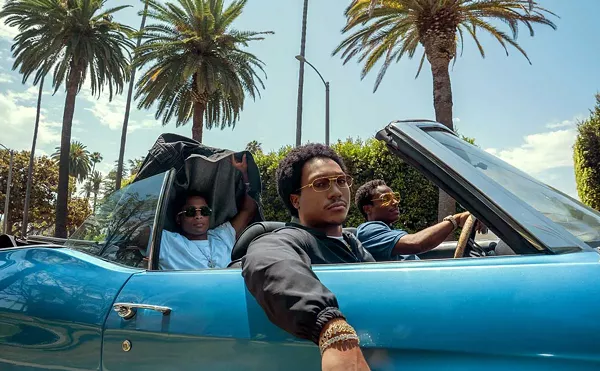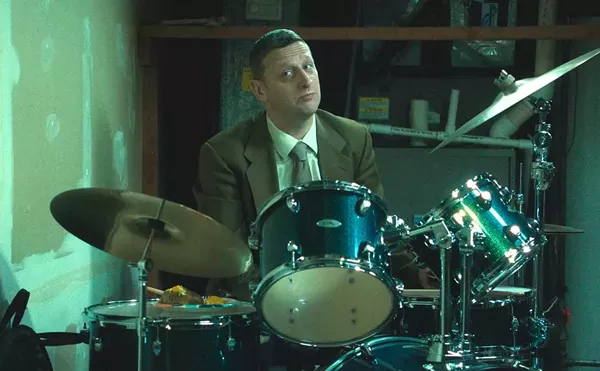Chimpanzee
You drive me ape - Really? Does the natural world need to look like a morality tale?

Audio By Carbonatix
[
{
"name": "GPT - Leaderboard - Inline - Content",
"component": "35519556",
"insertPoint": "5th",
"startingPoint": "3",
"requiredCountToDisplay": "3",
"maxInsertions": 100,
"adList": [
{
"adPreset": "LeaderboardInline"
}
]
}
]
Chimpanzee
B-
When the images are this compelling, this gorgeously framed, it's easy to forget what kind of audience Disney had in mind with Chimpanzee — but only if you're deaf or bring an iPod to provide your own soundtrack. Otherwise you're stuck with Tim Allen's mocking, cutesy-pie narration and Disney's unrelenting anthropomorphization of wildlife. The latest in Disneynature's Earth Day releases (African Cats, Earth and Oceans), this nature doc journeys deep inside the remote Tai rainforest of Africa's Ivory Coast, where it follows Oscar, a baby chimp and his extended family. Through astonishingly intimate camera work, Alastair Fothergill and Mark Linfield capture the complicated social interactions of the chimps while highlighting the fragile circle of life that surrounds them. Whether it's observing the apes learning to crack open nuts with rocks and dig bugs out of logs or interactions that shift from playful and tender to angry and aggressive in a heartbeat, Chimpanzee does a remarkable job of making you feel as if you are in the rain forest beside the apes. The time-lapse photography alone is nearly worth the price of admission.
But instead of using Oscar's story to actually teach us more about the lives of these fascinating creatures and the challenges their endangered species face, Disney feels the need to concoct their formulaic view of reality, forcing inspirational themes like family love and the triumph of "good" chimps over "bad" chimps, by stitching together a storyline from incidents that occurred during shooting.
Now, attaching human traits to wildlife would seem a given for a company that's built its fortunes on the haunches of Mickey Mouse, Dumbo and The Lion King. But there's got to be a limit. Does the natural world really need to be shaped into a cartoonish morality tale?
The movie's central storyline hinges on Oscar being orphaned after the death of his mother (another tried and true Disney plot device) and his struggle to survive. Will the chimps' aging leader, Freddy, adopt the adorable little fella? (Does a monkey throw shit at the zoo?)
Chimpanzee seriously crosses the line when it introduces a rival group of chimps led by "Scar," who engages in a turf war over access to food. Never once is "Scar and his thugs" seen with females or youngsters in tow, because Disney needs a villain. It's a damaging narrative trick that brazenly and unnecessarily casts natural survival as a battle between virtue and evil. I suppose it's a tonic to the disturbing tales of chimp cannibalism that Animal Planet likes to spotlight, but to the kids that'll be dragged to the multiplex it sends the message that human morality is the template for all life.
Worse, Allen never shuts up. Ever. Cornball narration has always been a trademark of Disneynature films but here the voice of Pure Michigan suffers from the kind of verbal diarrhea that makes you want throw popcorn at the screen.
In the end, image triumphs over narrative. While Chimpanzee may be reckless in its view of the natural world, there's little doubt families will be won over by its stunning footage and endlessly appealing subjects. Still, one has to wonder why Dr. Jane Goodall attached her name to such a scientifically flimsy film. Given her lifelong concern over the fragile state of the great apes wouldn't Scar and his "mob" be deserving of respect and protection too? —Jeff Meyers





